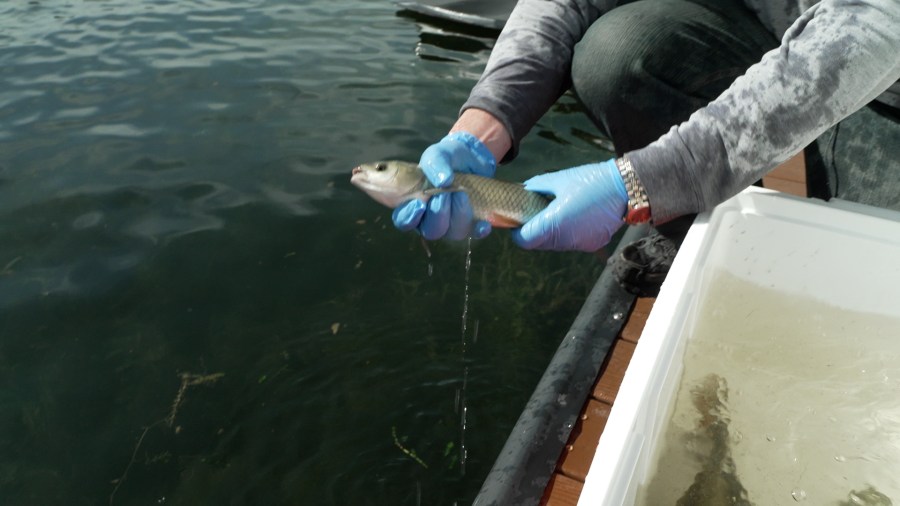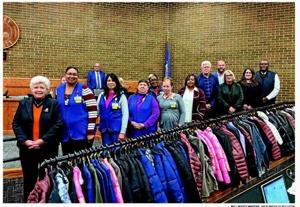Science
Local Fishermen Voice Concerns Over Grass Carp Release in Lake Austin

The City of Austin’s decision to release 350 sterile grass carp into Lake Austin to combat the invasive plant species, hydrilla, has sparked significant concern among local fishermen. Announced on July 14, 2023, this initiative aims to control hydrilla’s rapid growth, which poses challenges for both swimmers and boaters by obstructing waterways.
Hydrilla can proliferate quickly, making navigation difficult and threatening local ecosystems. The introduction of grass carp, which primarily feed on hydrilla, is part of a broader strategy to manage the invasive species. Dr. Brent Bellinger, the conservation program supervisor with the city’s Watershed Protection Department, expressed hopes that this measured approach would help mitigate previous failures. He noted, “By taking this kind of very scaled-down, measured approach, and also trying to get ahead of it, we’re hoping to avoid some of the calamities of the past.”
A previous attempt to manage hydrilla saw the release of 32,000 grass carp in Lake Austin from 2011 to 2013. Unfortunately, this led to significant declines in underwater vegetation, impacting the entire aquatic food chain. Dr. Bellinger warned that without hydrilla, the grass carp would consume native plants, which could also disrupt the local ecosystem.
Local fisherman Carson Conklin, who leads fishing tours on Lake Austin, voiced concerns regarding the ecological consequences of removing vegetation. “When you take all the grass out of a lake, everything kind of follows,” he said, emphasizing that the absence of grass diminishes habitats for smaller fish, which are crucial for sustaining larger fish species such as bass. He described fishing in a grass-rich environment as “more productive and more enjoyable.”
The current release of carp will occur on the east side of Pennybacker Bridge, targeting a smaller area than previous efforts. Dr. Bellinger hopes that this limited release will focus strictly on controlling hydrilla without compromising the overall health of the lake’s ecosystem. “Austin is regarded as a very popular bass fishery. The absence of all vegetation is also not desirable,” he explained.
While the city’s plan aims to prevent hydrilla from overwhelming the lake, fishermen like Conklin suggest exploring alternative methods for control, such as specialized machines that function like underwater lawnmowers. Despite these alternatives, hydrilla’s resilience, particularly its ability to reproduce through fragmentation, complicates management efforts.
In a previous incident in 2017, many carp migrated downstream to Lady Bird Lake following their release. Dr. Bellinger anticipates that the new batch of grass carp will remain in Lake Austin unless a significant flooding event occurs.
As the city moves forward with this initiative, the balance between managing invasive species and preserving the local fishing ecosystem remains a critical concern for both authorities and the fishing community. The outcome of this effort will be closely monitored, as both fishermen and city officials share a vested interest in ensuring the long-term health of Lake Austin.
-

 Technology5 months ago
Technology5 months agoDiscover the Top 10 Calorie Counting Apps of 2025
-

 Health2 months ago
Health2 months agoBella Hadid Shares Health Update After Treatment for Lyme Disease
-

 Health3 months ago
Health3 months agoErin Bates Shares Recovery Update Following Sepsis Complications
-

 Technology4 months ago
Technology4 months agoDiscover How to Reverse Image Search Using ChatGPT Effortlessly
-

 Technology1 month ago
Technology1 month agoDiscover 2025’s Top GPUs for Exceptional 4K Gaming Performance
-

 Technology2 months ago
Technology2 months agoElectric Moto Influencer Surronster Arrested in Tijuana
-

 Technology5 months ago
Technology5 months agoMeta Initiates $60B AI Data Center Expansion, Starting in Ohio
-

 Technology5 months ago
Technology5 months agoRecovering a Suspended TikTok Account: A Step-by-Step Guide
-

 Health4 months ago
Health4 months agoTested: Rab Firewall Mountain Jacket Survives Harsh Conditions
-

 Lifestyle5 months ago
Lifestyle5 months agoBelton Family Reunites After Daughter Survives Hill Country Floods
-

 Technology4 months ago
Technology4 months agoHarmonic Launches AI Chatbot App to Transform Mathematical Reasoning
-

 Technology3 months ago
Technology3 months agoUncovering the Top Five Most Challenging Motorcycles to Ride



















